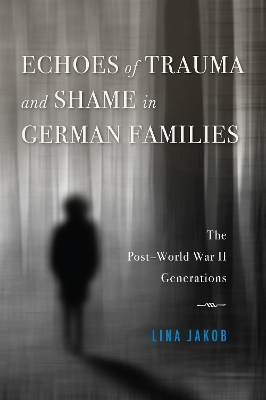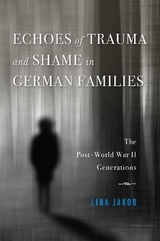Echoes of Trauma and Shame in German Families
The Post–World War II Generations
Seiten
2020
Indiana University Press (Verlag)
978-0-253-04824-0 (ISBN)
Indiana University Press (Verlag)
978-0-253-04824-0 (ISBN)
How is it possible for people who were born in a time of relative peace and prosperity to suddenly discover war as a determining influence on their lives?
For decades to speak openly of German suffering during World War II—to claim victimhood in a country that had victimized millions—was unthinkable. But in the past few years, growing numbers of Germans in their 40s and 50s calling themselves Kriegsenkel, or Grandchildren of the War, have begun to explore the fundamental impact of the war on their present lives and mental health. Their parents and grandparents experienced bombardment, death, forced displacement, and the shame of the Nazi war crimes. The Kriegsenkel feel their own psychological struggles—from depression, anxiety disorders, and burnout to broken marriages and career problems—are the direct consequences of unresolved war experiences passed down through their families.
Drawing on interviews, participant observation, and a broad range of scholarship, Lina Jakob considers how the Kriegsenkel movement emerged at the nexus between public and familial silences about World War II, and critically discusses how this new collective identity is constructed and addressed within the framework of psychology and Western therapeutic culture.
For decades to speak openly of German suffering during World War II—to claim victimhood in a country that had victimized millions—was unthinkable. But in the past few years, growing numbers of Germans in their 40s and 50s calling themselves Kriegsenkel, or Grandchildren of the War, have begun to explore the fundamental impact of the war on their present lives and mental health. Their parents and grandparents experienced bombardment, death, forced displacement, and the shame of the Nazi war crimes. The Kriegsenkel feel their own psychological struggles—from depression, anxiety disorders, and burnout to broken marriages and career problems—are the direct consequences of unresolved war experiences passed down through their families.
Drawing on interviews, participant observation, and a broad range of scholarship, Lina Jakob considers how the Kriegsenkel movement emerged at the nexus between public and familial silences about World War II, and critically discusses how this new collective identity is constructed and addressed within the framework of psychology and Western therapeutic culture.
Lina Jakob is a cultural anthropologist with a PhD from the Australian National University.
Acknowledgments
Abbreviations
Introduction
1. Between 'Mastering' and 'Silencing' the Past –Public Commemorations of World War II
2. "Why do you Have to Dig Around in the Past?" –Conversations About World War II in German Families
3. Better 'Sick' Than 'Strange' –The Kriegsenkel Movement and the Desire to Legitimize Suffering
4. "Hooray, I am a Kriegsenkel!" –Suffering and Liberation in the Age of Therapy
5. The Invisible Wounds of War –Kriegsenkel Accounts of Transgenerational Transmission
6. The Losses and the Shame of War –Absence in Kriegsenkel Narratives
Conclusion
Appendix –Interview Structure and Sample Questions
Bibliography
Index
| Erscheinungsdatum | 05.05.2020 |
|---|---|
| Verlagsort | Bloomington, IN |
| Sprache | englisch |
| Maße | 152 x 229 mm |
| Gewicht | 535 g |
| Themenwelt | Geschichte ► Allgemeine Geschichte ► 1918 bis 1945 |
| Geschichte ► Allgemeine Geschichte ► Zeitgeschichte | |
| Geisteswissenschaften ► Geschichte ► Regional- / Ländergeschichte | |
| Geschichte ► Teilgebiete der Geschichte ► Kulturgeschichte | |
| Sozialwissenschaften ► Soziologie | |
| ISBN-10 | 0-253-04824-9 / 0253048249 |
| ISBN-13 | 978-0-253-04824-0 / 9780253048240 |
| Zustand | Neuware |
| Haben Sie eine Frage zum Produkt? |
Mehr entdecken
aus dem Bereich
aus dem Bereich
ein Psychologe erlebt das Konzentrationslager
Buch | Hardcover (2024)
Kösel (Verlag)
CHF 30,80
Mythos „Stauffenberg-Attentat“ – wie der 20. Juli 1944 verklärt und …
Buch | Hardcover (2024)
Goldmann (Verlag)
CHF 33,55




